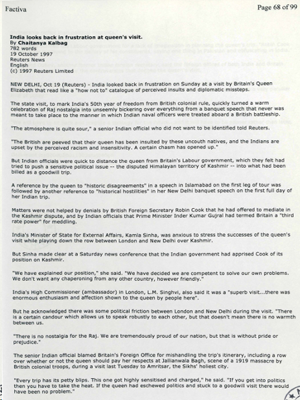India looks back in frustration at queen’s visit
[Reuters]
Published date: 19th Oct 1997
19 October 1997
Reuters News
English
(c) 1997 Reuters Limited
NEW DELHI, Oct 19 (Reuters) – India looked back in frustration on Sunday at a visit by Britain’s Queen Elizabeth that read like a “how not to” catalogue of perceived insults and diplomatic missteps.
The state visit, to mark India’s 50th year of freedom from British colonial rule, quickly turned a warm celebration of Raj nostalgia into unseemly bickering over everything from a banquet speech that never was meant to take place to the manner in which Indian naval officers were treated aboard a British battleship.
“The atmosphere is quite sour,” a senior Indian official who did not want to be identified told Reuters.
“The British are peeved that their queen has been insulted by these uncouth natives, and the Indians are upset by the perceived racism and insensitivity. A certain chasm has opened up.”
But Indian officials were quick to distance the queen from Britain’s Labour government, which they felt had tried to push a sensitive political issue — the disputed Himalayan territory of Kashmir — into what had been billed as a goodwill trip.
A reference by the queen to “historic disagreements” in a speech in Islamabad on the first leg of tour was followed by another reference to “historical hostilities” in her New Delhi banquet speech on the first full day of her Indian trip.
Matters were not helped by denials by British Foreign Secretary Robin Cook that he had offered to mediate in the Kashmir dispute, and by Indian officials that Prime Minister Inder Kumar Gujral had termed Britain a “third rate power” for meddling.
India’s Minister of State for External Affairs, Kamla Sinha, was anxious to stress the successes of the queen’s visit while playing down the row between London and New Delhi over Kashmir.
But Sinha made clear at a Saturday news conference that the Indian government had apprised Cook of its position on Kashmir.
“We have explained our position,” she said. “We have decided we are competent to solve our own problems. We don’t want any chaperoning from any other country, however friendly.”
India’s High Commissioner (ambassador) in London, L.M. Singhvi, also said it was a “superb visit … there was enormous enthusiasm and affection shown to the queen by people here”.
But he acknowledged there was some political friction between London and New Delhi during the visit. “There is a certain candour which allows us to speak robustly to each other, but that doesn’t mean there is no warmth between us.
“There is no nostalgia for the Raj. We are tremendously proud of our nation, but that is without pride or prejudice.”
The senior Indian official blamed Britain’s Foreign Office for mishandling the trip’s itinerary, including a row over whether or not the queen should pay her respects at Jallian wala Bagh, scene of a 1919 massacre by British colonial troops, during a visit last Tuesday to Amritsar, the Sikhs’ holiest city.
“Every trip has its petty blips. This one got highly sensitised and charged,” he said. “If you get into politics then you have to take the heat. If the queen had eschewed politics and stuck to a goodwill visit there would have been no problem.”
Indian foreign policy experts spread their blame equally.
“It’s all very sad,” Jyotindra Nath Dixit, a former Indian foreign secretary, told Reuters. “I hope this unnecessary controversy does not affect the substance of ties between the two countries. Britain may not be as influential but it is an important economic partner … The focus should have been to build on economic partnership rather than political theatrics.
” But he also blamed the Labour government for a lack of imagination in planning the queen’s trip. “Robin Cook in particular is playing to the gallery of his constituents, saying one thing in Pakistan and obfuscating in India.”
Muckkund Dubey, another former Indian foreign secretary, said the foreign offices of both India and Britain had to share the blame for the controversies that dogged the queen’s visit.
“Our entire foreign policy has assumed a role of reacting to the media,” he told Reuters. He said Indian diplomats seemed to feel a need to react to any reaction or statement on their concerns. “It is a very peculiar kind of policy .”
The senior Indian official said both governments would now have to carry out a lot of damage limitation.
“We will have to sit back and prepare a strategy for the future … and it will have to be sooner rather than later. At a popular level it will have an impact — there will be a certain suspicion.” REUTERS
(c) Reuters Limited 1997






